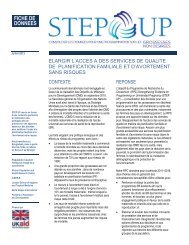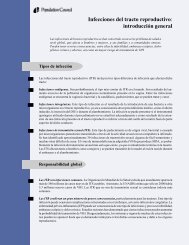Community Health Volunteer's Training Manual - Population Council
Community Health Volunteer's Training Manual - Population Council
Community Health Volunteer's Training Manual - Population Council
You also want an ePaper? Increase the reach of your titles
YUMPU automatically turns print PDFs into web optimized ePapers that Google loves.
Module 3 The Work of the <strong>Health</strong> Committee<br />
172<br />
What then is this new supervision approach? How does it work? Let us discuss it.<br />
Facilitative supervision is different from the traditional way of supervising in that it tries to<br />
improve upon the traditional methods. Facilitative supervision:<br />
• focuses on helping the supervisee solve problems through the use of qualityimprovement<br />
tools;<br />
• focuses on processes rather than on individuals;<br />
•<br />
assists supervisee in planning for future quality-improvement goals;<br />
• is continuous and builds on past gains while setting higher quality improvement goals for<br />
the future;<br />
•<br />
•<br />
•<br />
•<br />
emphasises mentoring;<br />
adopts a joint problem-solving approach;<br />
is a two-way communication between a supervisor and those being supervised; and<br />
enables volunteers and community workers to learn about local needs and suggestions<br />
for improvement.<br />
Like C-COPE, (Module 2) the process of facilitative supervision includes identifying and<br />
analyzing problems, developing action plans and prioritising solutions with the one you<br />
are supervising. Because it is a two-way communication process, the community members,<br />
volunteers, community health committees and the health staff all get involved. As we said<br />
earlier we use facilitative supervision to improve upon the quality of the health services we<br />
deliver.<br />
Facilitative supervision can be done by everyone. It only requires some qualities and skills<br />
which can be learned. You will also need to develop leadership skills as well as character<br />
traits. This helps you the supervisor to be people-centered, patient and a good listener.<br />
As a supervisor you should be knowledgeable also about health delivery as well as current<br />
trends. Finally, the volunteers and other people you supervise want someone who will<br />
support and encourage them. These are things you must learn to do in facilitate supervision.<br />
Benefits of Facilitative Supervision<br />
Facilitative supervision is important because of its many benefits, even though it entails<br />
a lot more work than traditional supervision. To benefit from the method, both parties<br />
must invest extra time and effort in the supervision process. Some of the known benefits of<br />
facilitative supervision are as follows:<br />
•<br />
Helps both supervisor and supervisee to save time because there will be fewer problems<br />
to solve
















